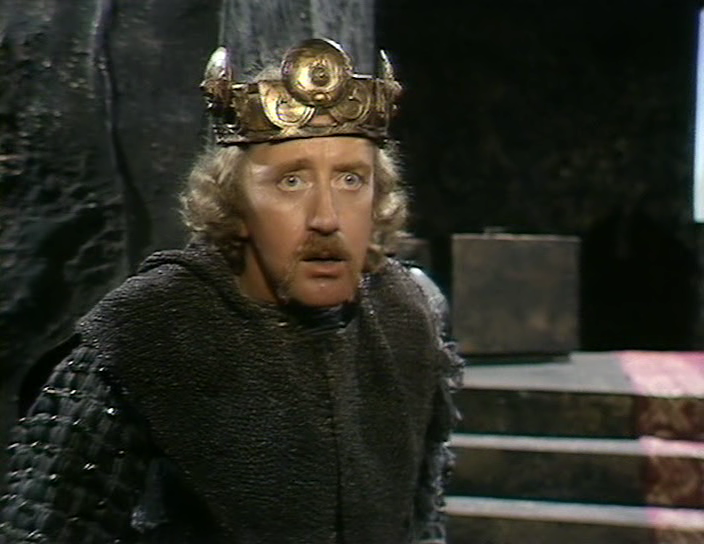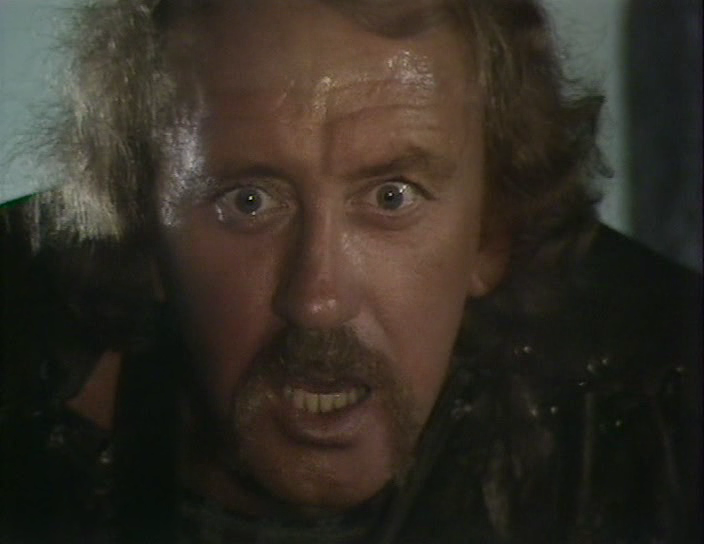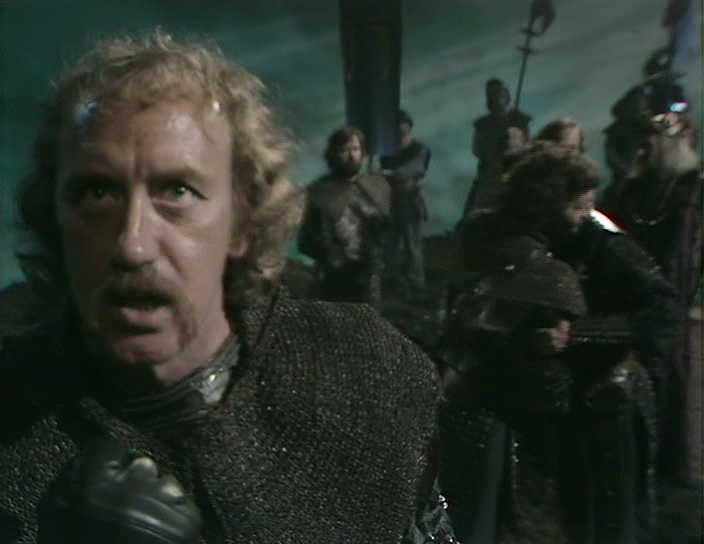

Making its debut with Romeo and Juliet on 3 December 1978, and concluding nearly seven years later with Titus Andronicus on 27 April 1985, the BBC Television Shakespeare project was the single most ambitious attempt at bringing the Bard of Avon to the small screen, both at the time and to date.
Producer Cedric Messina was already an experienced producer of one-off television Shakespeare presentations, and was thus ideally qualified to present the BBC with a daunting but nonetheless enticingly simple proposition: a series of adaptations, staged specifically for television, of all 36 First Folio plays, plus Pericles (The Two Noble Kinsmen was considered primarily John Fletcher's work, and the legitimacy of Edward III was still being debated).
The scale of Messina's proposal, far greater than that of previous multi-part Shakespeare series such as An Age of Kings (BBC, 1960) and Spread of the Eagle (BBC, 1963), required an American partner in order to guarantee access to the US market, deemed essential for the series to recoup its costs. Time-Life Television agreed to participate, but under certain controversial conditions - that the productions be traditional interpretations of the plays in appropriately Shakespearean period costumes and sets, designed to fit a two-and-a-half-hour time slot.
The running-time requirement was swiftly jettisoned when it became clear that the major tragedies in particular would have suffered severely, but other artistic restrictions remained largely in place throughout. Although later productions under Messina's successors Jonathan Miller and Shaun Sutton would be more experimental, Miller was unable to persuade first-choice directors such as Peter Brook and Ingmar Bergman to take part, and Michael Bogdanov resigned from Timon of Athens (eventually tx, 4/16/1981, with Miller himself directing) after his modern-dress interpretation was considered too radical a departure.
This gave the BBC Television Shakespeare cycle the reputation of being overly staid and conventional, which was not always deserved. Though Messina's own productions (1978-80) were largely conservative, Jonathan Miller (1980-82) revamped things both visually (thanks to a design policy of sourcing sets and costumes from great paintings of the era in which the play was set) and in terms of direction and casting, in some cases using popular actors with little or no Shakespeare experience (John Cleese as Petruchio, Bob Hoskins as Iago) to attract new and younger audiences.
Under Miller, directors such as Jack Gold, Jane Howell and Elijah Moshinsky were encouraged to be more adventurous, with Howell in particular adopting such a stylised approach for The Winter's Tale (tx. 8/2/1981) and the Henry VI/Richard III cycle (tx. 2-23/1/1983) that they pushed the definition of "traditional" to the limit, but also garnered the series some of its best reviews. Miller's aesthetic policies continued under Shaun Sutton (1982-85), who brought the project to a belated close.
Whatever its artistic reputation, there was no doubt that the BBC Television Shakespeare was a commercial triumph, breaking even financially by 1982 (ahead of expectations) and fully justifying Messina's gamble. Its success was helped by the rapid growth of video recorders in schools, creating a secondary market that was much bigger than initially predicted - though the initial decision to sell the plays only as a complete set provoked complaints from people who baulked at paying the substantial asking price because they were after a smaller selection or individual titles. The BBC eventually released some of the more popular titles separately, but it was not until late in 2005 that the entire series was available individually on DVD at a competitive price.
Although the BBC Television Shakespeare project as a whole met with a mixed reception, it had several positive virtues. Chief among them was the fact that its completist remit meant that several of the more obscure plays received their first television adaptation, and in most cases the BBC version remains the only one. Happily, such productions as Henry VIII (tx. 25/2/1979), Cymbeline (tx. 10/7/1983), Pericles (tx. 11/6/1984) and Titus Andronicus were considered amongst the cycle's most impressive achievements, with Henry VIII subsequently voted the best production of all by the Shakespeare Association of America.
A complete list of BBC Television Shakespeare productions is as follows:
Series One (producer: Cedric Messina): Romeo and Juliet (tx. 3/12/1978), Richard II (tx. 10/12/1978), As You Like It (tx. 17/12/1978), Julius Caesar (tx. 11/2/1979), Measure For Measure (tx. 18/2/1979), Henry VIII (tx. 25/2/1979)
Series Two (p. Cedric Messina): Henry IV Part One (tx. 9/12/1979), Henry IV Part Two (tx. 16/12/1979), Henry V (tx.23/12/1979), Twelfth Night (tx. 6/1/1980), The Tempest (tx. 27/2/1980), Hamlet (tx. 25/5/1980).
Series Three (p. Jonathan Miller): The Taming of the Shrew (tx. 23/10/1980), The Merchant of Venice (tx. 17/12/1980), All's Well That Ends Well (tx. 4/1/1981), The Winter's Tale (tx. 8/2/1981), Timon of Athens (tx. 16/4/1981), Antony and Cleopatra (tx. 8/5/1981)
Series Four (p. Jonathan Miller): Othello (tx. 4/10/1981), Troilus and Cressida (tx. 7/10/1981), A Midsummer Night's Dream (tx. 13/12/1981)
Series Five (p. Jonathan Miller, Shaun Sutton): King Lear (tx. 19/9/1982), The Merry Wives of Windsor (tx. 28/12/1982), Henry VI Part One (tx. 2/1/1983), Henry VI Part Two (tx. 9/1/1983), Henry VI Part Three (tx. 16/1/1983), Richard III (tx. 23/1/1983), Cymbeline (tx. 10/7/1983)
Series Six (p. Shaun Sutton): Macbeth (tx. 17/10/1983), The Comedy of Errors (tx. 24/12/1983), The Two Gentlemen of Verona (tx. 27/12/1983), Coriolanus (tx. 21/4/1984), Pericles (tx. 11/6/1984)
Series Seven (p. Shaun Sutton): King John (tx. 24/11/1984), Much Ado About Nothing (tx. 30/11/1984), Love's Labour's Lost (tx. 5/1/1985), Titus Andronicus (tx. 27/4/1985)
The BBC also produced Shakespeare in Perspective, an accompanying series of 25-minute personal introductions to individual plays by an eclectic range of presenters from the literary (Anthony Burgess, Dennis Potter, Jilly Cooper) to the scholarly (Germaine Greer, Frank Kermode, Michael Wood) to the celebrity (Roy Hudd, George Melly, Barry Took). These usually took the form of straight-to-camera addresses from assorted locations with some connection to the play, which were intercut with extracts from the accompanying BBC Shakespeare production, usually screened later that evening.
Michael Brooke
For the BBC Television Shakespeare, tx. 17/10/1983, 146 mins, colour
Director Jack Gold
Production Company BBC Television, Time-Life Television
Producer Shaun Sutton
Script Editor David Snodin
Designer Gerry Scott
Music Carl Davis
Cast: Nicol Williamson (Macbeth); Jane Lapotaire (Lady Macbeth); Ian Hogg (Banquo); Mark Dignam (Duncan); James Hazeldine (Malcolm); Tony Doyle (Macduff); James Bolam (Porter); Brenda Bruce, Eileen Way, Anne Dyson (Witches)
After hearing a prophecy that he will be crowned King of Scotland, Macbeth, encouraged by his wife, attempts to make it come true - no matter what the cost.

Broadcast relatively late in the BBC Television Shakespeare cycle, Jack Gold's Macbeth takes a similar approach to his Merchant of Venice (BBC, 1980), in that it consists of an almost complete performance (cutting only the Hecate scenes and the English doctor's report to Malcolm, which few productions bother with) set in a highly stylised studio set inspired by the period and setting.

Gold consciously shunned the 'Elizabethan' look that had dominated the BBC Shakespeares up to then, preferring to evoke a pre-medieval impression of Scotland, with designer Gerry Scott paying particular attention to the giant backdrops depicting the skies (the weather being crucial to the mood of this particular play), and costume designer Michael Burdle devising a Viking-Celtic look appropriate to the time (though there were few concrete visual references to draw on).
Gold also decided to play down the supernatural elements, believing that these occurred primarily within Macbeth's fevered imagination. Accordingly, neither the famous dagger, Banquo's ghost or the line of kings in the witches' second prophecy are depicted on screen. This approach relies heavily on the skills of the actor playing Macbeth, but Gold was well served by Nicol Williamson's interpretation - even more than Ian McKellen in the great Trevor Nunn RSC production (filmed by ITV in 1979), he seems permanently on the verge of a nervous breakdown - in Gold's words, "daring himself to see how far he will go".

Jane Lapotaire's Lady Macbeth deliberately avoids the conventional interpretation of her as an unredeemable fiend in human form, believing that the text supports a reading of her as being primarily ambitious for her husband rather than herself, coupled with a better understanding of his capabilities and limitations than he does. Her first scene is particularly interesting for the way that she deliberately emphasises the underlying eroticism of the great "unsex me here" speech, delivered while writhing on a bed: she's driven by her own sexuality rather than any external elements.

Williamson and Lapotaire are the main reasons for watching this production, though the supporting cast are never less than competent, and James Bolam contributes a particularly fine cameo as the Porter. If it's ultimately a good rather than great Macbeth, this is because the 1979 production set impossible standards for the deliberately conservative and conventional BBC Shakespeare cycle to measure up to. It is greatly to Gold's credit that he at least tries to meet it halfway.
Michael Brooke
http://rapidshare.com/files/113058932/MACBETH_BBC.part01.rar
http://rapidshare.com/files/113060242/MACBETH_BBC.part02.rar
http://rapidshare.com/files/113061475/MACBETH_BBC.part03.rar
http://rapidshare.com/files/113062708/MACBETH_BBC.part04.rar
http://rapidshare.com/files/113063954/MACBETH_BBC.part05.rar
http://rapidshare.com/files/113065095/MACBETH_BBC.part06.rar
http://rapidshare.com/files/113066191/MACBETH_BBC.part07.rar
http://rapidshare.com/files/113067391/MACBETH_BBC.part08.rar
http://rapidshare.com/files/113068496/MACBETH_BBC.part09.rar
http://rapidshare.com/files/113069573/MACBETH_BBC.part10.rar
http://rapidshare.com/files/113070637/MACBETH_BBC.part11.rar
http://rapidshare.com/files/113071695/MACBETH_BBC.part12.rar
http://rapidshare.com/files/113071945/MACBETH_BBC.part13.rar
no pass



0 comments:
Post a Comment